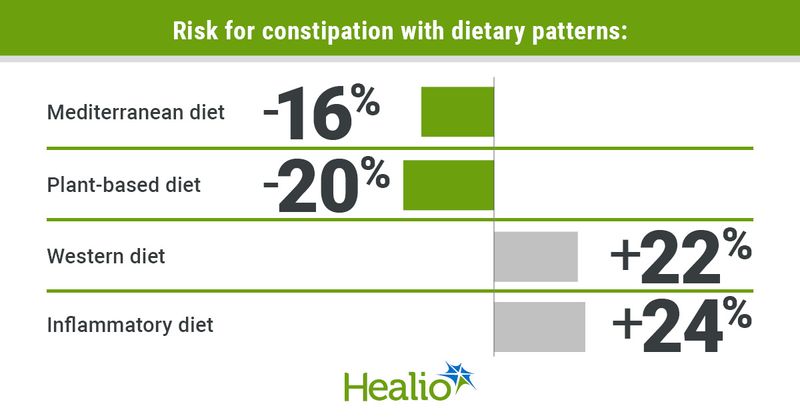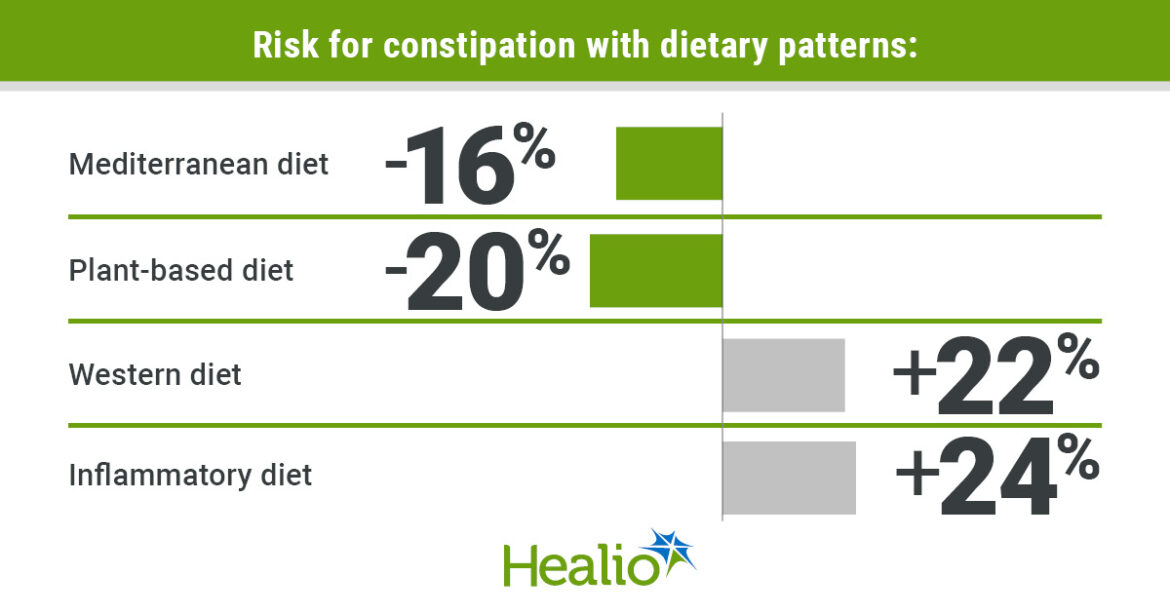Add topic to email alerts
Receive an email when new articles are posted on
Please provide your email address to receive an email when new articles are posted on .
“
data-action=”subscribe”>
Subscribe
We were unable to process your request. Please try again later. If you continue to have this issue please contact customerservice@slackinc.com.
Back to Healio
Key takeaways:
Long-term adherence to Mediterranean and plant-based diets was associated with reduced risk for chronic constipation.
Western and inflammatory diets were linked to increased risk.
Long-term adherence to plant-based and Mediterranean diets may help prevent chronic constipation, independent of fiber intake, according to study results published in Gastroenterology.
“A lot of the dietary information about constipation, like eating more fiber, is really about what do you do once you have constipation already,” Kyle Staller, MD, MPH, associate professor of medicine at Harvard Medical School and director of the Gastrointestinal Motility Laboratory at Massachusetts General Hospital, told Healio. “I think the unique part of this study is that we’re looking at people who don’t have constipation. We want to see how their dietary patterns potentially prevent or cause constipation — and not just any constipation but specifically chronic constipation.”

Data were derived from Wang Y, et al. Gastroenterology. 2025;doi:10.1053/j.gastro.2025.06.020.
Staller and colleagues pooled data from three large cohorts — Nurses’ Health Study, Nurses’ Health Study II and the Health Professional Follow-up Study — for the study, which followed the dietary patterns of nearly 96,000 middle- and older-aged adults (average age, 78.4 years, 60.5 years and 78.6 years, respectively).
Using validated quadrennial food frequency questionnaires, researchers identified long-term adherence to five dietary patterns: alternate Mediterranean diet, low-carbohydrate diet, Western diet, plant-based diet and inflammatory diet.
Questionnaires also helped identify individuals who self-reported symptoms of chronic constipation — including reduced frequency of bowel movements, lumpy or hard stools, and excessive straining — for at least 12 weeks in the past year. Researchers also identified participants with irritable bowel syndrome with constipation if they experienced abdominal pain during bowel movements.
Results showed 7,519 cases of incident constipation over 2 to 4 years of follow-up.
Adherence to a Mediterranean diet or plant-based diet was associated with a 16% and 20% decreased risk for constipation, respectively. Conversely, adherence to an inflammatory diet or Western diet was linked to a 24% and 22% increased risk for constipation, respectively.

Kyle Staller
“Interestingly, we found a significant decrease in the likelihood of developing chronic constipation among those who are following the Mediterranean and the plant-based diet, and a significant increase among those who are following a Western or inflammatory diet,” Staller said. “We have known for years the Mediterranean diet is helpful from a cardiovascular standpoint, but what we’ve found is that it is, in fact, protective against chronic constipation.”
The decreased risk associated with Mediterranean and plant-based diets was independent of fiber intake, according to Staller.
“I think fiber is still helpful, but interestingly there is something additional about the Mediterranean diet that is beneficial from a constipation perspective,” he said. “It may not be just isolated nutrients like fibers. It may be that there are other aspects of this diet that modulate the gut microbiome.”
The Mediterranean diet is a nutritious, heart-healthy option that also may help reduce the risk for constipation, due to its emphasis on fruits, vegetables and overall dietary quality, Staller added.
“I think people have to do some of the hard work in terms of dietary modification rather than just adding a certain specific food or a specific supplement to try to prevent constipation,” he said. “The important point is that we are preventing constipation with diets, rather than treating constipation with a diet. I think prevention is very impactful, especially because these dietary patterns have so many benefits outside of just constipation.”
For more information:
Kyle Staller, MD, MPH, can be reached at kstaller@mgh.harvard.edu.
Perspective
Back to Top

Being a cardiac dietitian for more than 20 years, I have made Mediterranean and plant-based diets the foundation of my recommendations toward cardiac disease prevention and management.
This study’s findings, which show that these diets also are beneficial for the treatment of chronic constipation, independent of the fiber, are very interesting. We know that Mediterranean and plant-based diets are both great sources of dietary fiber, which can aid in the management of cholesterol, blood sugars, blood pressure and weight.
Fiber also feeds the gut microbiome. However, fiber can lead to constipation when it is not paired with enough fluid.
The long-term benefits of eating heavy plant-based meals not only come from fiber, but also healthy fats that can soften the stool and make it easier to pass. We do not yet fully understand all the microbes in the gut, but we know there are several good microbes that are fed and maintained with a heavy plant-based diet, which aid in regular bowel movements. This happens by:
• producing short-chain fatty acids, such as butyrate, which stimulates intestinal nerve activity and increases contractions, therefore aiding gut motility;
• providing a diverse microbiome with keystone bacteria, which kill off harmful bacteria that may contribute to constipation; and
• supporting a healthy gut microbiome that can modulate the immune response, therefore leading to reduced inflammation in the gut and preventing constipation.
A healthy gut microbiome also leads to better nutrient absorption, which can indirectly affect gut function. Beneficial bacteria have been shown to improve gut function, motility and transit, which leads to better formed and regular bowel movements. Microbial fermentation produces metabolites that also influence motility and transit.
A diverse microbiome fed by a plant-heavy diet can aid in the long-term management of constipation by increasing keystone bacteria, which fight off bad bacteria, help with gut motility and transit, support the gut’s immune system, increase the integrity of the gut lining, and improve nutrient absorption.
Julia Zumpano, RD, LD
Cleveland Clinic
Disclosures: Zumpano reports no relevant financial disclosures.
Published by:
Ask a clinical question and tap into Healio AI’s knowledge base.
PubMed, enrolling/recruiting trials, guidelines
Clinical Guidance, Healio CME, FDA news
Healio’s exclusive daily news coverage of clinical data
Learn more
Add topic to email alerts
Receive an email when new articles are posted on
Please provide your email address to receive an email when new articles are posted on .
“
data-action=”subscribe”>
Subscribe
We were unable to process your request. Please try again later. If you continue to have this issue please contact customerservice@slackinc.com.
Back to Healio



Dining and Cooking